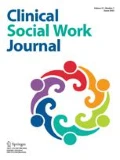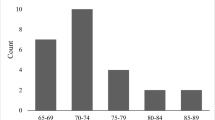Abstract
The benefits of volunteering are well-documented, however, studies specifically investigating the cessation of volunteering in old age are relatively limited, especially on multiple stops of volunteering. The present study explores the number of times older people stop volunteering over 14 years, and examines its association with financial resources, health, family demands, social networks, neighborhood environment as well as the sociodemographic characteristics. Using eight-wave data from the Health and Retirement Study, the sample included 3914 volunteers who were 50 + in 1998 and were alive throughout 2012. Among the sample, 32.75% never stopped volunteering, 41.47% stopped once, 20.77% stopped twice, and 5.01% stopped three times. Findings from Poisson regression models indicated that respondents who were older, less educated, less religious, had lower income at baseline, later developed cognitive problems, became caregivers, and had no friends living nearby were more likely to stop volunteering multiple times. Findings from the present study suggest retaining volunteers by adjusting volunteering responsibilities for older volunteers who are more vulnerable to volunteering cessation and encouraging continued commitment by maximizing their friendship and religious networks.
Similar content being viewed by others
References
Burr, J. A., Choi, N. G., Mutchler, J. E., & Caro, F. G. (2005). Caregiving and volunteering: Are private and public helping behaviors linked? Journal of Gerontology,60B(5), S247–256.
Butrica, B. A., Johnson, R. W., & Zedlewski, S. R. (2009). Volunteer dynamics of older Americans. Journals of Gerontology,64B(5), 644–655.
Choi, N. G., & Chou, R. J. A. (2010). Time and money volunteering among older adults: The relationship between past and current volunteering and correlates of change and stability. Ageing & Society,30(4), 559–581.
Doi, K., Matsuyama, Y., & Ohashi, Y. (2006). Analysis of quality of life data with death and drop-out in advanced non-small-cell lung cancer patients. Japanese Journal of Biometrics,27(1), 17–33.
Jegermalm, M., & Grassman, E. J. (2013). Links between informal caregiving and volunteering in Sweden: A 17-year perspective. European Journal of Social Work,16(2), 205–219.
Johnston, R., Jones, K., & Manley, D. (2018). Confounding and collinearity in regression analysis: A cautionary tale and an alternative procedure, illustrated by studies of British voting behaviour. Quality & quantity,52(4), 1957–1976. https://doi.org/10.1007/s11135-017-0584-6.
McBride, A. M., Gonzales, E., Morrow-Howell, N., & McCrary, S. (2011). Stipends in volunteer civic service: Inclusion, retention, and volunteer benefits. Public Administration Review,71(6), 850–858. https://doi.org/10.1111/j.1540-6210.2011.02419.x.
McNamara, T. K., & Gonzales, E. (2011). Volunteer transitions among older adults: The role of human, social, and cultural capital in later life. Journals of Gerontology,66B(4), 490–501.
Morrow-Howell, N., Hinterlong, J., Rozario, P. A., & Tang, F. (2003). Effects of volunteering on the well-being of older adults. Journal of Gerontology,58B, S137–S145.
Musick, M. A., & Wilson, J. (2003). Volunteering and depression: The role of psychological and social resources in different age groups. Social Science & Medicine,56(2), 259–269.
National Academies of Sciences, Engineering, and Medicine [NASEM]. (2016). Families caring for an aging America. Washington, DC: The National Academies Press. https://doi.org/10.17226/23606
Okun, M., Infurna, F. J., & Hutchinson, I. (2016). Are volunteer satisfaction and enjoyment related to cessation of volunteering by older adults? Journals of Gerontology,71B(3), 439–444.
Olah, J., & Harvey, D. (2019). The older Americans act: An example of bipartisan public policy. Public Policy & Aging Report,29(2), 45–47.
Rotolo, T. (2000). A time to join, a time to quit: The influence of life cycle transitions on voluntary association membership. Social Forces,78(3), 1133–1161.
Rubin, D. B. (2000). Comment on “Causal inference without counterfactuals" by Dawid, A.P. Journal of the American Statistical Association,95, 435–437.
Shen, H.-W. (2017). Resource and Strategic Mobilization Model of productive aging: Examining older Americans’ participation in various productive activities. Ageing International,42(1), 23–43. https://doi.org/10.1007/s12126-016-9259-1.
Skaff, M., & Pearlin, L. (1992). Caregiving: Role engulfment and the loss of self. The Gerontologist,32, 656–664.
Tabachnick, B. G., & Fidell, L. S. (2012). Using multivariate statistics (6th ed.). London: Pearson Education.
Tang, F., Morrow-Howell, N., & Choi, E. (2010). Why do older adult volunteers stop volunteering? Ageing & Society,30(5), 859–878.
Tyler, T. R., & Blader, S. L. (2000). Cooperation in groups: Procedural justice, social identity, and behavioral engagement. Philadelphia, PA: Taylor & Francis.
United States Department of Labor. (2016). Volunteering in the United States, 2015. Retrieved June 28, 2019 from https://www.bls.gov/news.release/volun.nr0.htm.
van Willigen, M. (2000). Differential benefits of volunteering across the life course. The Journals of Gerontology,55B(5), S308–S318.
Author information
Authors and Affiliations
Corresponding author
Ethics declarations
Conflict of interest
The authors declare no conflicts of interest.
Additional information
Publisher's Note
Springer Nature remains neutral with regard to jurisdictional claims in published maps and institutional affiliations.
Rights and permissions
About this article
Cite this article
Shen, HW., Wang, Y., Wong, R. et al. Resource and Network Predictors of Multiple Volunteering Cessations: Implications for Social Policy and Practice. Clin Soc Work J 48, 189–195 (2020). https://doi.org/10.1007/s10615-020-00748-x
Published:
Issue Date:
DOI: https://doi.org/10.1007/s10615-020-00748-x




